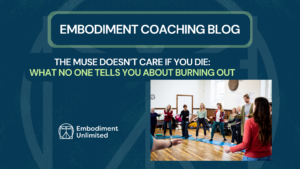Explore how nature, centering practices, and a principles-based approach can deepen and enhance the effectiveness of embodiment coaching for both coaches and clients.
Review of Parts Two
In Part Two, we built upon the foundations of embodiment coaching by exploring the importance of cultivating a range of coaching styles and the value of adaptability in meeting diverse client needs. We discussed the effectiveness of skills-based learning, emphasising the gradual development of core competencies to create a sustainable and practical practice. Additionally, we addressed the challenges of facilitating behavioural change, highlighting the significance of realistic, incremental steps and the supportive role of peer accountability. Finally, we acknowledged the emotional complexities that arise when working with the body, underscoring the coach’s responsibility to engage with their own emotions and the broader influence of relationships and environment. This discussion paves the way for deeper understanding and application in the ongoing journey of embodiment coaching.
Nature as a Catalyst for Change
Nature possesses a unique ability to support embodiment practices. Spending time in natural environments encourages deeper bodily and emotional connection, promoting presence and grounding.
Retreats in serene natural settings have been transformative, allowing coaches and clients to connect more intuitively. These experiences often lead to organic and profound shifts requiring less direct intervention.
The Duality of Being an Embodied Coach
An effective embodiment coach navigates the duality of being both an embodied individual and a facilitator of specific techniques. This balance enables coaches to embody the principles they teach while applying methods to assist clients.
In a world that often prioritises cognitive thinking, incorporating embodiment provides a direct and impactful avenue for change.
Techniques and Tools for Effective Coaching
While techniques alone do not define effective coaching, certain practices, such as centring, have proven beneficial. Centring involves regulating one’s emotional state to promote clarity and creativity, which can significantly enhance coaching sessions.
State regulation techniques are essential for both the coach and client, impacting the effectiveness of their collaborative work.
Principles Over Techniques
When teaching techniques, understanding underlying principles is crucial. Coaches should remain adaptable, guided by core concepts rather than being rigidly tied to specific methods. This approach provides flexibility in coaching sessions and ensures the effectiveness of techniques.
Part Three Summary
In this third exploration of embodiment coaching, we considered the profound influence of nature in deepening embodiment practices, noting how natural environments foster grounding and intuitive connection. We discussed the duality of being an embodied coach, balancing personal embodiment with the facilitation of impactful techniques. We also emphasised the importance of centring and state regulation for both coaches and clients, enhancing the effectiveness of their work together. Lastly, we highlighted the value of being guided by core principles rather than rigidly adhering to techniques, allowing for greater adaptability and meaningful client engagement. These insights prepare us for the next stage in understanding the holistic potential of embodiment coaching.
Become a certified embodiment coach
Learn the principles, tools and techniques you need to coach safely and effectively with the body. You’ll explore ways to work with your clients to bring about real, lasting change and support them in their growth.
For more information about the Certificate of Embodiment Coaching – visit our CEC page



